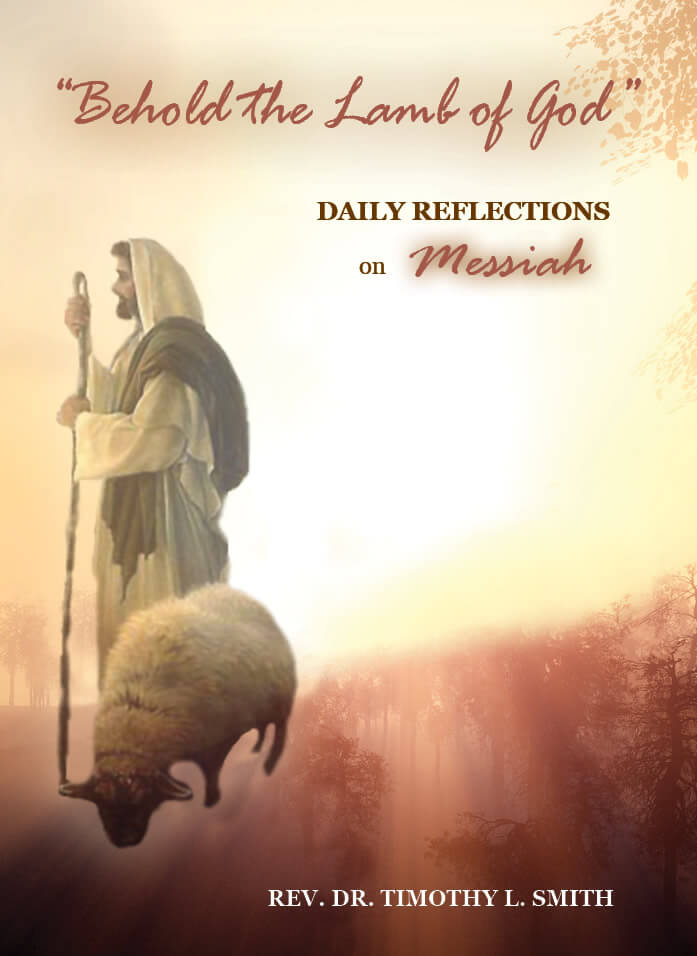As you read and reflect on today’s Holy Week devotional, please listen to these tracks from “Messiah”.
“If God be for us, who can be against us?…Who shall lay anything to the charge of God’s elect? It is God that justifieth, who is he that condemneth? It is Christ that died, yea, rather, that is risen again, who is at the right hand of God, who makes intercession for us.”
Romans 8:31, 33-34
TEXT
Here is the breathtaking good news of the Bible: God is for us! The Creator of heaven and earth, and the Redeemer of the world is for us. But if we read the Bible we know that God would have good reason to be against us. Earlier in Romans we read that “all have sinned and come short of the glory of God” (Romans 3:23). And an earlier chorus in Messiah confessed: “All we like sheep have gone astray, we have turned everyone to his way” (Isaiah 53:6). And yet, God is for us, stepping in and taking our side.
For Scripture to declare that God is for us means far more than saying He is for us in the trials and heartaches of life. God being “for us” connects to God’s purpose set forth in the immediately preceding verses: God is working all things together for our good that we might be conformed to the image of His Son (see Romans 8:28-29). This means that no danger or threat can stand against God’s determined purpose of making us share in His Son’s life and glory. We are left to exclaim in wonder: “If God be for us, who can be against us?”
Who then can lay any “charge” against us? No one! No one can accuse or condemn any who belong to Messiah. God is the only one with authority to charge us with guilt, but He is “for us”. The Judge has become our Justifier. We are justified by Jesus Messiah.
There is a popular definition that “justified” means “just-as-if-I’d-never-sinned”. While it is a memorable play on words, it falls far short of what God has done for us through Messiah. God has done far more than acquit us of our sin. The Bible’s teaching on justification is that God not only cancels out our sin, but in addition reckons to us the very righteousness of Jesus Christ. See the Apostle Paul’s amazing declaration of God’s justification of the sinner through Christ: “For God hath made Christ to be sin for us, who knew no sin; that we might be made the righteousness of God in him” (II Corinthians 5:21). The good news that God justifies would better be expressed as: “just-as-if-I’d-lived-a-life-of-perfect-righteouness!” God declares the sinner not only to be forgiven, but to be righteous in Christ. He looks upon us and deals with us as perfectly righteous in His Son.
Until the Trumpet blows we will struggle with sin and temptation, but no one can ever condemn or charge us before God. It is Jesus who died for us, and Jesus who reigns at God’s right hand interceding for us. He is for us. The One to whom the Father entrusted the judgment of the world (John 5:22) has Himself borne our own judgment on the Cross.
The old Scottish preacher and poet Horatio Bonar marveled at the grace of God to us in Christ Jesus and wrote:
Upon a Life I have not lived,
Upon a Death I did not die,
Another’s Life; Another’s Death:
I stake my whole eternity.”
MUSIC
Musicologist Calvin Stapert calls this “the most comforting text in Messiah for our day-to-day existence”. The Messiah oratorio, which began more than 2 hours earlier with the Lord’s command “Comfort ye my people”, now draws toward the conclusion with this gentle, reassuring movement.
The thought that God is for us must have rendered Handel speechless, as he writes 24 bars of tranquil orchestra before the soprano starts to sing. Handel marks this movement as larghetto (slow) in order to give us time to meditate on the thought that God is completing His eternal purpose for us.
We have heard the loud splendor of previous pieces such as, “The Hallelujah Chorus”, and “The Trumpet Shall Sound”, but now the music brings the quiet assurance that God is for us. The music is reserved, unassuming, not drawing attention to itself as the Word says all that needs to be said: God is for us.
PRAYING MESSIAH
- What do you sense that God might be saying to you in today’s Scripture text and music from Messiah?
- What do you want to say to God?
- Now take a few moments to be still in God’s presence.




